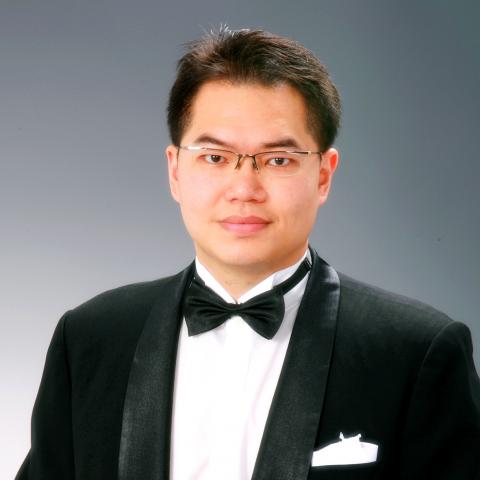Private orchestras, almost by definition, enter into arrangements with private companies, including prominent financial ones. And so it is that next Friday the Evergreen Symphony Orchestra (ESO) is presenting a Yuanta Financial Holdings VIP Night entitled Dance With Johann Strauss. Most tickets are for sale to the public, however, with discounts including 50 percent off for students.
The program is much more interesting that it might seem at first sight. “Dance With Johann Strauss” suggests an endless progression of waltzes, but ESO music director Gernot Schmalfuss is not one to be satisfied with that, and he has in fact devised what looks like a rather interesting evening’s entertainment.
His key move has been to engage the services of two young Taiwanese wind instrumentalists, giving one of them a complete concerto to play, and the other two substantial movements. There’ll also be a popular orchestral suite, and finally, for incurable addicts of Viennese waltzes, a string of these to wind up proceedings.

Photo courtesy of ESO
The first of the items for wind soloists is Jan Koetsier’s Tuba Concerto. Koetsier was a Dutch composer and musician — he died in 2006. His tuba concerto will offer a chance to experience a sonorous and orotund instrument too rarely thrown into prominence in a solo role. The soloist is prize-winning tuba player Tsai Meng-hsin (蔡孟昕).
The other piece profiling a wind instrumentalist is Weber’s Andante e Rondo Ungarese (Hungarian andante and rondo), to be played by bassoonist Hsu Chia-hua (許家華). This item was originally written for violin but was adapted for the bassoon in 1813. It consists of a slow theme with three contrasting variations, followed by a skittish and frequently rather difficult rondo.
But before either of these we’ll hear from another, and much more interesting, Strauss, Richard. His most popular opera, Der Rosenkavalier (The Knight of the Rose), was presented in Taipei to great acclaim in 2007. Strauss made two orchestral suites out of its melodies, and the ESO will be playing the first of them.
Rosenkavalier was a pioneering mix of late 18th-century elegance, modernist orchestral effects and 19th-century Viennese waltzes. The result became the last of the European grand operas.
The concert begins, however, with Franz von Suppe’s light-hearted Morning, Noon and Night in Vienna and the second half opens with the same composer’s Pique Dame Overture. A selection of Johann Strauss’ well-known waltzes ends the evening.
The Evergreen musicians are always a delight to hear, and next Friday’s colorful and easily digestible program should prove no exception.
ESO plays at the National Concert Hall, Taipei, on Jan. 21 beginning at 7:30pm. Tickets are NT$500 to NT$1,500, with discounts available, including 50 percent off for students. Some details are available at www.evergreensymphony.org, or call the ESO directly on (02) 2351-6799. For reservations go to www.ntch.edu.tw or call (02) 3393-9888.

On April 26, The Lancet published a letter from two doctors at Taichung-based China Medical University Hospital (CMUH) warning that “Taiwan’s Health Care System is on the Brink of Collapse.” The authors said that “Years of policy inaction and mismanagement of resources have led to the National Health Insurance system operating under unsustainable conditions.” The pushback was immediate. Errors in the paper were quickly identified and publicized, to discredit the authors (the hospital apologized). CNA reported that CMUH said the letter described Taiwan in 2021 as having 62 nurses per 10,000 people, when the correct number was 78 nurses per 10,000

As Donald Trump’s executive order in March led to the shuttering of Voice of America (VOA) — the global broadcaster whose roots date back to the fight against Nazi propaganda — he quickly attracted support from figures not used to aligning themselves with any US administration. Trump had ordered the US Agency for Global Media, the federal agency that funds VOA and other groups promoting independent journalism overseas, to be “eliminated to the maximum extent consistent with applicable law.” The decision suddenly halted programming in 49 languages to more than 425 million people. In Moscow, Margarita Simonyan, the hardline editor-in-chief of the

Six weeks before I embarked on a research mission in Kyoto, I was sitting alone at a bar counter in Melbourne. Next to me, a woman was bragging loudly to a friend: She, too, was heading to Kyoto, I quickly discerned. Except her trip was in four months. And she’d just pulled an all-nighter booking restaurant reservations. As I snooped on the conversation, I broke out in a sweat, panicking because I’d yet to secure a single table. Then I remembered: Eating well in Japan is absolutely not something to lose sleep over. It’s true that the best-known institutions book up faster

Though the total area of Penghu isn’t that large, exploring all of it — including its numerous outlying islands — could easily take a couple of weeks. The most remote township accessible by road from Magong City (馬公市) is Siyu (西嶼鄉), and this place alone deserves at least two days to fully appreciate. Whether it’s beaches, architecture, museums, snacks, sunrises or sunsets that attract you, Siyu has something for everyone. Though only 5km from Magong by sea, no ferry service currently exists and it must be reached by a long circuitous route around the main island of Penghu, with the